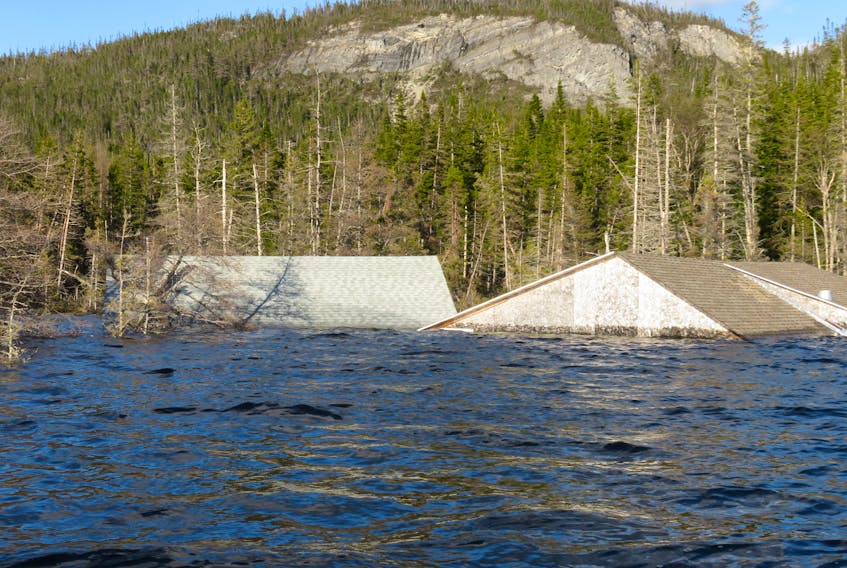Any hope Mark Hoyles had of salvaging what’s left of his cabin at Bottomless Pond may have literally floated away.
It’s been more than a year now since his remote western Newfoundland getaway became inaccessible because it, along with several other cabins in the area, was submerged in floodwaters.
Last Friday, Hoyles was informed that one of his neighbours’ cabins had actually come off its foundation. The next evening, he was told his may also have become set adrift.
Hoyles immediately went to check it out for himself and discovered that none of the cabins at the pond were where they’re supposed to be.

Two adjacent cabins, belonging to Hoyles and his brother Melvin, were on the other side of the pond.
Someone else’s cabin had actually settled in where Hoyles’ cabin had been built.
He said a fourth cabin was also displaced, but hadn’t moved much only because it had been pushed up against the tree line near its proper location.
Bottomless Pond is believed to have a natural drainage somewhere on the bottom of the pond, but that system has not been working since major flooding in the winter and spring of 2018. Only the roofs of the cabins have been visible ever since.
While it seemed like the water was beginning to drop, this year’s spring thaw has only driven it even higher.
Hoyles estimates it to be 10 or more feet above the highest point it was last year.
Even a bypass road built to get around the flooded-out area last year is now under water.
“Nobody ever thought in their life they’d see the water this high,” he said Monday.
The cabin owners, he acknowledged, did think it was possible for a cabin to float away if the water got high enough and a trapped air pocket made it buoyant, but can’t believe it has happened to four of them.
He hasn’t completely given up hope of salvaging what he can from his cabin.
“We’re thinking of tying it on so it doesn’t go away any further,” he said. “If the water does go down, it’s just a matter of cutting about 100 feet of road and you’d be able to get into it on quad.”

If or when the water is going to recede is anyone’s guess.
Hoyles and the others with cabins in the area are still trying to be exempted from paying the fees associated with leasing their properties from the provincial government. To date, they have bene told they are expected to keep paying those fees.
Hoyles said part of terminating a lease agreement is removing any structures on the property or be held responsible for having their areas cleaned up.
He hopes this new development of the cabins floating off their leased plots will finally change government’s tune about what’s expected of the displaced cabin owners.
“There’s no access to the cabins and most of them aren’t even on their land anymore anyway, so it’s adding insult to injury,” he said of being expected to continue paying for land he can’t enjoy.
“I have over $30,000 and five years of my time invested in my cabin. Now, they’re telling me if I cancel my lease, I’m responsible for going in and tearing it down and paying probably another $10,000 to clean it up? That’s kicking someone when they’re down, isn’t it?”
The Western Star has asked the Department of Fisheries and Land Resources, which is responsible for administering Crown lands, if the displaced cabins changes anything with regard to the owners paying their fees.
The Star has also asked the Department of Municipal Affairs and Environment if this new development will require it to become involved.
Both departments were still working on responses as of deadline Monday.
RELATED
- Relentless flooding has meant endless heartache for Bottomless Pond cabin owner Mark Hoyles
- Mark Hoyles frustrated nothing being done about flooding woes in Bottomless Pond
- Water seems to be receding a little, but still few answers to Bottomless Pond’s flooding issue
- Bottomless Pond cabin owner frustrated with waiting for flood water levels to recede
- Flooded cabin owner says he’s never seen Bottomless Pond rise so high









